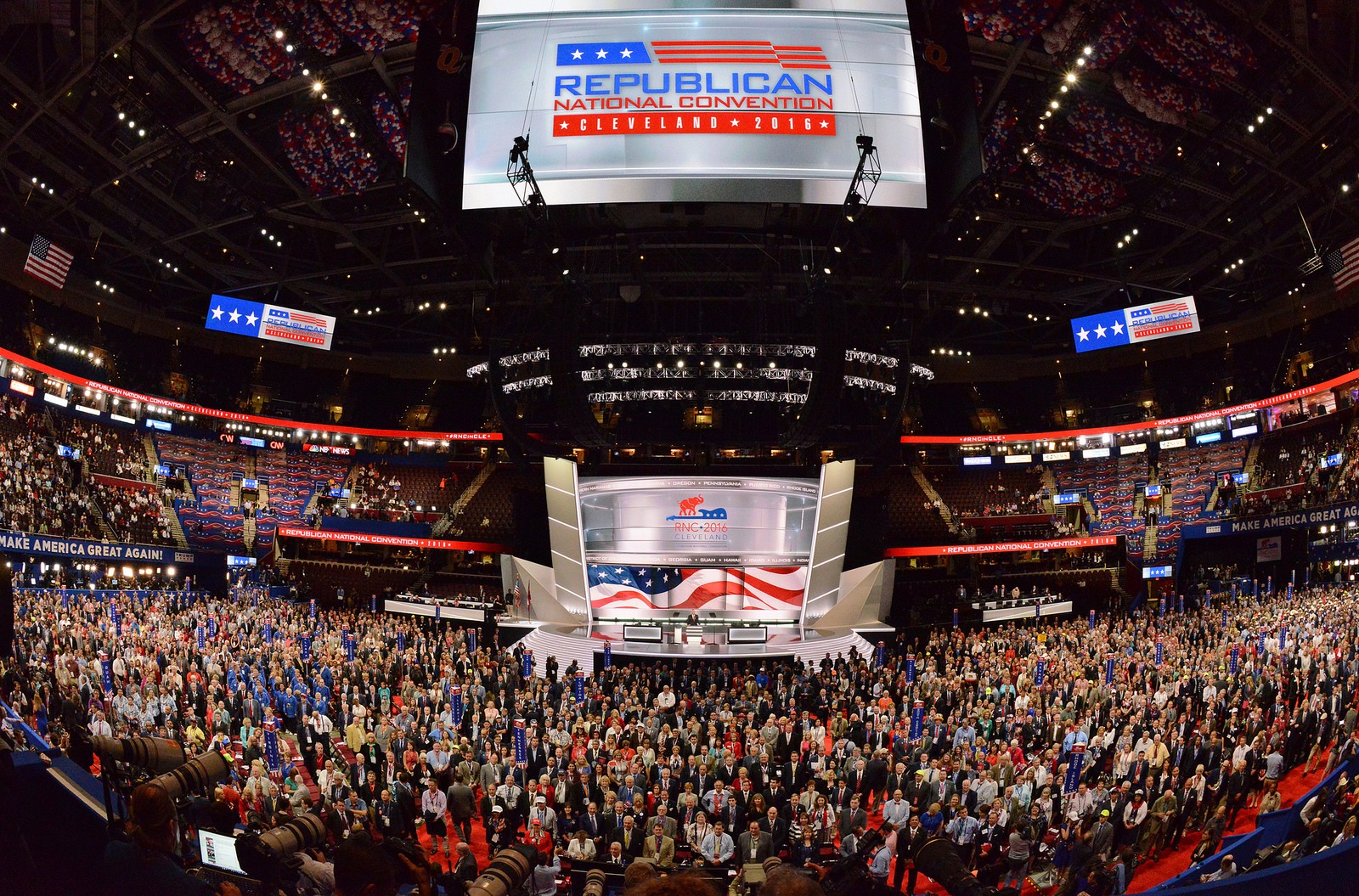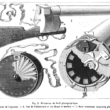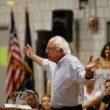Photo Credit: ABC/ Fred Watkins
Cleveland
The week has felt like a familiar nightmare come true. A possible Trump presidency facilitated by an unprecedented convergence of security forces and imperiled only by Clinton II is a dystopian plot line straight out of Gen-X pop culture. One relic from that era appeared at the Republican National Convention in the form of the nostalgia-trip band Prophets of Rage—a group made up of remnants of Rage Against the Machine and Public Enemy. I arrived at the vacant lot where the band was performing for hundreds on the first sunny afternoon of the convention, a few miles from downtown Cleveland. Although intended to “Make America Rage Again,” the Prophets’ performance, mostly songs from the ’90s, felt more like a warning: dream darker.
Deep into the afternoon, a march of roughly 500 people, organized by the Resist the Cleveland RNC network, started southwest from the concert site toward downtown, through the fissured streets. Locals peeked out of fading homes and businesses to take cell phone videos of the “parade,” as I overheard one police officer call it. The FBI had labeled the network “anarchist extremist”—one of six domestic extremist ideologies the bureau lists on its website as a threat to the nation—and our movement was tightly controlled. Endless droves of black-armored cops on bicycles flanked our formation, directing us toward the downtown skyline. Low-flying helicopters added to the sense of urban militarism.
One marcher named Sylvia Oduno, a compact woman who wore a green T-shirt representing her organization, the Michigan Welfare Rights Organization, told me the water crises afflicting poor people in her state exposed the worst aspects of a profit-driven system. “The leadership in Michigan basically operates like Trump, they think the private sector will take care of problems,” she said. “We need something more radical. But here we are trying to make these statements for real systemic change we need, and we’re kind of fenced in on both sides of us by the police state. It’s sort of symbolic of where we’re at, every time we try and advance for our rights, there’s someone trying to shut us down.”
“Making America great again means getting rid of our current political process.”
The police eventually halted the march a few blocks from the Quicken Loans convention center. In addition to Ohio and federal security, Cleveland also imported officers from the Austin Police Department, the Florida Highway Patrol, the Montana Highway Patrol, the Indiana Highway Patrol, New Jersey State Police, and the California Highway Patrol, bringing the total number of cops hired to regulate the convention to 5,500. The ragtag marchers stood no chance of doing anything spontaneous under their gaze. Faced with a row of mounted police to our front, a string of police on bikes behind us, and an unknown number of other ghouls leering down at us from behind the tinted glass of surrounding buildings, we dispersed to an open public square at the corner of the intersection.
Like the rest of the media parasites who’d descended on the city, I’d expected to see more blood spilled between Trump supporters and their antagonists, based on what’s happened at some of Trump’s rallies. But few people seemed willing to fight amid so much security. Instead, most seemed content to passionately argue with each other in what might as well have been foreign languages. In the public square after the march, I happened upon a lone white guy wearing a red “Make America Great Again” hat, which he apparently felt safe enough to do despite the leftist crowd.
“I showed up to support the candidate of my choice,” said the man, a 20-year-old college student named Ethan Howard, “but a couple of people in the anarchist garb have shouted shit at me, like ‘Get the fuck out of here, fascist.’ And I’m ignoring that because I want to stay peaceful.”
Howard, who described himself as a “Trump moderate” and a former supporter of Bernie Sanders, said he disagreed with Trump’s hardline stance on immigration. He supports Trump because he believes he is a true populist candidate. “Making America great again means getting rid of our current political process and electing somebody who is an outsider, and creating a movement where people are more aware of the money that goes into the politics in this country,” he declared, as a police siren wailed nearby.
***
Howard’s moderation wasn’t something I found in any of the other Trump supporters I spoke to.
I met a large young man in a Trump T-shirt who identified, proudly, as a white man and told me his name is Eli. As with some young nationalists who follow alt-right leader Richard Spencer (also at the convention), Eli was motivated to embrace his whiteness, he said, in response to what he saw as the assault of political correctness—a favored target of Trump—on his identity. “We turn around the identity politics of the left and say, ‘Well, actually you don’t understand what it’s like to be privileged, so your opinion isn’t valid.’ We’re using the exact same argument in the exact same way [as the left] because we believe if it’s valid in one case it’s valid in the other.”
Although he’s never personally suffered as a direct result of immigration, he conceded, Eli deeply fears a future where whites in America are a minority. I played along, telling him that as a minority I couldn’t understand why this concerned him so much. “You’re a minority in a white country,” he told me, even after I said my family had been here for over a century, “so it’s no skin off your back. But for me, I see what happened in Rhodesia and in South Africa and it’s a warning. Nobody asked us to be a minority. This agenda is being imposed on us through immigration, [and] through various other means.”
The dual anxiety over outsiders corrupting American culture (however it is defined) and political correctness was also on the minds of other white nationalists in attendance, including a representative of the overtly anti-immigrant group Soldiers of Odin, who told me that he saw political correctness as “Orwellian.” But it was also on the minds of more mainstream Republicans like Chris, a member of Students for Trump at Georgia Southern University who wore an “Americans for Prosperity” T-shirt.
“Most immigrants we are getting now, they vote for the left,” Chris said in rapid spurts, his whitish tongue appearing sandpaper-dry. “If we have amnesty and they’re all legal to vote, we’ll never get a conservative in office again.” It may sound harsh, he acknowledged, but Trump had opened space for people like him to tell it like it is—free of the constraints of p.c. tyrants.
Overt racism may be one of the ugliest things about the Republican party right now, but Trump’s open embrace of greed and high-on-the-hog living is what’s won him appeal with some in the party’s establishment.
Things are bad, very bad, and we will fuck them up even worse if we can’t acknowledge how very bad they are.
I caught a glimpse of this at a downtown steakhouse. I’d shown up with two other reporters after learning that Bob Dole was celebrating his 93rd birthday there. (Unfortunately, we missed that sighting). As we awkwardly sat at the bar watching Fox News convention coverage, a bald red-faced man with an official-looking lanyard loudly toasted to “mak[ing] America strong again.” While we prepared to leave, another man who identified himself as a lobbyist, drunkenly complained that the steakhouse was “not crawling with pussy” as he’d apparently been promised.
The intense militarization of this city was ultimately in service of people like this, well-connected insiders for whom a Trump presidency will have no existential bearing. What would be a threat to their existence, and to the monied interests they represent, is genuine civil unrest in our nation’s cities, a possibility that appears less farfetched as the racialized underclasses over which they preside grow to resent each other even more. The only sure thing keeping the pieces stitched together, it seems, is a well-oiled, blue-hued security state.
And when you see these forces mobilize in the flesh, you realize that any uprising with the slightest potential of success cannot rely on people amassing in the streets, because police have perfected the art of separating bodies from each other with minimal violence.
I realized this on Tuesday afternoon, when hundreds of cops filled Cleveland’s public square following a small scuffle between InfoWars’ Alex Jones—the rabid, conspiratorial radio show host and Trump supporter—and a handful of protesters. As a restless crowd gathered, police used their bicycles to slice up the square into quadrants, maintaining an uneasy peace pierced by barked orders on the one hand, and equal parts anti-immigrant and anti-police-brutality sloganeering on the other. Reinforcements formed multiple rings around the neutered protester contingents. On a nearby stage, a member of the Greater Cleveland Immigrant Network played a garbled version of a Woody Guthrie song on the ukulele—a surreal contrast that short-circuited the senses.
But there seemed to be another lesson here, amid the phantasmagoric madness: we will not soothe ourselves to better days. Some still disagree that Donald Trump’s ascendency portends a fascist movement, but whether you choose to label it as such, imagining the worst possible future your mind can conjure is an essential step to avoiding a world you do not want to live in. Things are bad, very bad, and we will fuck them up even worse if we can’t acknowledge how very bad they are.
Groups targeted by Trump and his white nationalist acolytes understand this. On Wednesday morning, at the start of an action where a coalition of groups unfurled a huge canvas “wall” to protest Trump’s border plan, a woman named Brenda Perez from Nashville told me that she wasn’t willing to wait to see how the Trump movement plays out.
“Our communities are organizing and we’re getting people ready because we can’t wait,” she said. “President Trump sounds like an interesting future that I do not want to be part of.”
Aaron Cantú is a journalist based in New York City and a contributor to the forthcoming book Who Do You Serve, Who Do You Protect? Police Violence and Resistance in the United States (Haymarket, 2016).







0 Comments